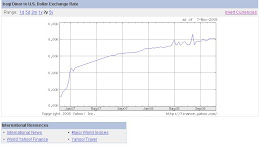"Inflation is our overriding concern," he told Reuters in an interview on the sidelines of an annual central bankers retreat here in the Grand Teton mountains organized by the Federal Reserve Bank of Kansas City.
Bitter sectarian violence between majority Shi'ite and minority Sunni Arabs have driven the country to the brink of civil war. The violence has also greatly damaged economic activity by driving up prices and inflicting terrible hardship on the country's millions of poor and unemployed.
Shabibi has raised interest rates to 20% and lifted the value of the dinar against the dollar, reducing monthly inflation, excluding food and energy prices, to 17% in July from 35% in June.
"Our monetary policy is functioning well," he said, adding that future action "depends on developments in inflation, taking into account developments in the economy and investment."
The actions have also helped to reduce the usage of dollars in the Iraqi economy, which was dominant after the 2003 US-led invasion to topple Saddam Hussein.
The dominance of the dollar was a problem for the central bank, which cannot curb inflation with traditional tools to control the domestic money supply if most of the country's commerce is handled in dollars.
Shabibi said the dinar had taken back its rightful role as the currency of choice for Iraqis.
"There used to be more confidence in the dollar than the dinar but the contrary is now true because of the dollar's loss in value," he said.
The Iraq dinar has appreciated to around 1,240 against the dollar from as low as 2,200 in the aftermath of the war.
Business is booming in the semi-autonomous region of Kurdistan in northern Iraq, but is much more subdued in the rest of the country, which relies almost exclusively on oil revenues for the foreign currency it needs to pay for imports.
Shabibi conceded that the poor security conditions were a big constraint on business, but argued there was a great deal of activity quietly taking place that was hard to spot but remained a source of reassurance.
"You don't get big building projects or other very visible types of activity, but there is a lot of small-scale business taking place," he said. "I would not be here if I was not still optimistic." (Source)Arabian Business

